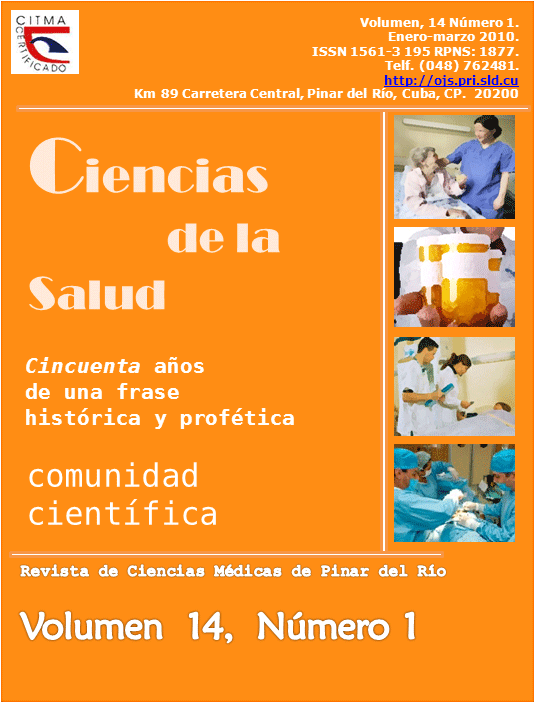Development of research skills in the training process of medical students
Abstract
The necessity of increasing the quality of preparation for the research process of graduates in Medical Sciences is a matter of discussion in last academic courses, particularly medical personnel having the responsibility for taking on the work of Primary Health Care. In view of the insufficiencies of medical students on the research component during the training process, which bears on the ways the graduates perform, a descriptive and cross-sectional study was conducted. The objective was to determine the behavior of research skills in the training process of medical students during January-June 2009. The universe was comprised of all the students enroll at Medical College in Pinar del Rio. The sample was chosen at random, stratified and representative, that included the medical students enroll in all the academic years of medical studies, teaching staff and directors. A literature review and a documentary analysis of the syllabuses were carried out using empirical methods: survey, interview and the opinion of the experts. The instruments applied included a survey to the medical students and semi-structured interviews to professors. Concluding that the majority of the students consider the topics about methodology of research insufficient to develop skills, these topics respond to personal interest advised by the tutor. Student scientific activity represents the main identified way to develop research skills. Students consider the discipline of Methodology of Research very necessary in the syllabus.Downloads
References
1. González Pérez M. Currículo y Formación Profesoral. La Habana; 2007.Pp.106 -9.
2. Horruitiner Silva P. El proceso de formación en la universidad cubana. Revista Pedagogía Universitaria[revista en internet]. 2006[citado 23 marzo 2009], XI(3). Disponible en: http://revistas.mes.edu.cu/Pedagogia-Universitaria/articulos/2006/3/189406301.pdf/view?searchterm=cubana
3. Marchesi Á. Cambios sociales y cambios educativos en Latinoamérica [Online] 2008 [citado 23 marzo 2009]. Disponible en: http://www.schwartzman.org.br/simon/delphi/pdf/marchesi.pdf
4. Horruitiner Silva P. El proceso de formación en la universidad cubana. Revista Pedagogía Universitaria[revista en internet]. 2006[citado 23 marzo 2009], XI(3). Disponible en: http://revistas.mes.edu.cu/Pedagogia-Universitaria/articulos/2006/3/189406301.pdf/view?searchterm=cubana
5. Caballero González José Emilio. Análisis del perfil del egresado de la carrera de Medicina en la Universidad Médica Cubana. Educ Med Super [revista en la Internet]. 2000 Abr [citado 2009 Abr 13]; 14(1): 10-16. Disponible en: http://scielo.sld.cu/scielo.php?script=sci_arttext&pid=S0864-21412000000100002&lng=es
6. Ministerio de Salud Pública. Programa de la Asignatura Informática Médica II. Ciudad de La Habana; Ed. Científico-Técnica; 2005.
7. Ilizástigui Dupuy F. Experiencia cubana en la formación del Médico General Básico como Médico de la Familia. En su: Ilizástegui Dupuy F. La Educación Médica Superior y las necesidades de salud de la población. Inst. Sup. Cien. Med. Habana, La Habana: Ed. Científico-Técnica; 2007.Pp. 73-90.
8. Ministerio de Salud Pública. Plan de Estudio de la carrera de Medicina. La Habana: Ed. Científico-Técnica; 2005.
9. Álvarez de Zayas C. M. La Escuela en la Vida. La Habana: Ed. Pueblo y Educación; 1993.
10. Ilizástigui Douglas R. La formación del médico general básico en Cuba. Educ. Med. Salud. 1993; 27(2):189-205.
11. Ministerio de Salud Pública. Plan de Estudios para la formación del Médico General Básico Integral. Objetivos generales educativos e instructivos. La Habana: Ed. Científico-Técnico; 1985.
Published
How to Cite
Issue
Section
License
Authors who have publications with this journal agree to the following terms: Authors will retain their copyrights and grant the journal the right of first publication of their work, which will be publication of their work, which will be simultaneously subject to the Creative Commons Attribution License (CC-BY-NC 4.0) that allows third parties to share the work as long as its author and first publication in this journal are indicated.
Authors may adopt other non-exclusive license agreements for distribution of the published version of the work (e.g.: deposit it in an institutional telematic archive or publish it in a volume). Likewise, and according to the recommendations of the Medical Sciences Editorial (ECIMED), authors must declare in each article their contribution according to the CRediT taxonomy (contributor roles). This taxonomy includes 14 roles, which can be used to represent the tasks typically performed by contributors in scientific academic production. It should be consulted in monograph) whenever initial publication in this journal is indicated. Authors are allowed and encouraged to disseminate their work through the Internet (e.g., in institutional telematic archives or on their web page) before and during the submission process, which may produce interesting exchanges and increase citations of the published work. (See The effect of open access). https://casrai.org/credit/



